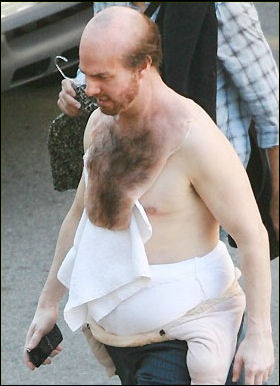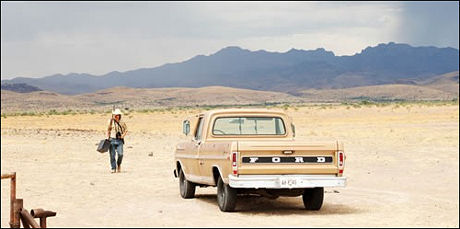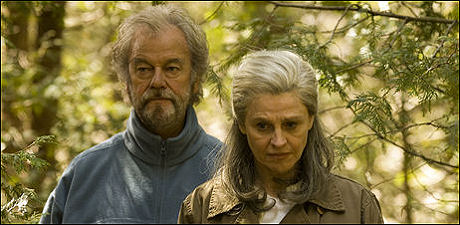Two Alec Baldwin thoughts via an 11.18 Huffington Post-ing: (1) “I saw Sean Penn‘s Into The Wild this weekend. Give Emile Hirsch the Jim Caviezel Award for the greatest suffering on film. I have not seen an actor put through this much in quite a while. Good job by Sean and Co.” and (2) “I miss my make-up artist, Stacey Panepinto. I miss my hairstylist, Richard Esposito. I miss all of the 30 Rock cast and crew, whom I don’t see anymore because of this motherfucking, motherfucking, motherfucking strike.”
Fat suit but no mobile
No clue when this Tom Cruise shot was taken or on what film set, but it seems to call into question his 11.12 statement that he has “no iPhone, no mobile.”

Apatow spells it out
Walk Hard, Knocked Up and Superbad producer-writer Judd Apatow has told N.Y. Times media columnist David Carr that “the business model that is driving the studios’ hard line is a little backward. Digital or not, well-written content can be a lucrative business.
“One of the problems is a lack of creativity,” Apatow says. “The studios spend enormous amounts of money making these massive spectacles when they could be making much better written, lower-cost movies. A few less of those and they could fund a settlement for years. There would be no reason for this strike.”
WGA spots shot, soon to play online
Polls are saying the public is far more supportive of the striking Writers Guild members than the studios and producers they’re striking against. Sensing a headwind, numerous name-level director-writers have recently shot a series of short spots intended for viewing either just before or soon after Thanksgiving that will presumably boost the WGA’s profile even higher and…whatever, energize the membership. As many as 50 spots will push the standard but irrefutable notion that screenwriters are absolutely invaluable and certainly deserve a small piece of the internet revenues to come.

Three of the spots have been directed by Paul Haggis (In The Valley of Elah), Rod Lurie (Nothing But The Truth) and George Hickenlooper (Factory Girl). William H. Macy, Sean Penn and Ed Asner have also, I’m told, participated in some fashion.
The spots are probably going to be viewable online starting on Wednesday, 11.21, although this date isn’t totally set in stone. One or two established entertainment websites may present the spots with (perhaps) a WGA-funded site doing so also. One concept calls for five new spots to appear online each day.
Some of the spots are dialogue-free and being rendered in black and white, the theme being that movies without writers would be, in a manner of speaking, silent.
If it turns out that a significant portion of the directors of the internet spots are members of the Directors Guild as well as the WGA, the appearance of the spots will probably be interpreted as a significant show of DGA solidarity with the writers.
Lurie’s spot will feature Nothing But The Truth costars Kate Beckinsale, David Schwimmer and Angela Bassett.
Haggis has shot a collection of spots joined by one concept with “nine or ten actor friends participating,” I was told this evening.

Real-life events behind “No Country”?
Kevin Bowen, who writes well, posted a fascinating piece last night about the certain names, places and events that may have inspired Cormac McCarthy‘s No Country for Old Men. In particular one Jamiel “Jimmy” Chagra, whose last name isn’t all that different from “Chigurh.”
Comfort blanket crowd
Every year the gulf between between those who judge films for what they actually are (or seem to be) and those who like or dislike films based on what the films do for them seems to get wider and wider. Industry lowbrows tend to favor comfort-blanket movies; others get their comfort blankets at Bed, Bath and Beyond and deal with movies on a slightly more engaged or inquisitive or cultured basis.

Case in point: Kris Tapley‘s item about No Country for Old Men screening at the Academy yesterday afternoon, and, according to one witness, how “‘people just got up shaking their heads’ following the film’s admittedly chilling ending.”
The guy also tells Tapley that “the screening was going well for the first hour or so, but the final act induced a certain level of shock that did not read as the positive sort. And, the attendee notes, there was very little applause over the film’s credits.”
You can’t goad people into being brighter or more educated or more respectful of the craft and intentions of the Coen brothers or original author Cormac McCarthy. You can try and shame them into responding a little less impulsively, but most of the comfort-blanketers are fairly dug into their way of seeing and processing. Some films reach right in and touch you; other times you have to probe and work your way into them. The general rule-of-thumb is that you need to at least try and meet a film halfway, but the comfort-blanket crowd…I don’t know. It’s very dispiriting. Infuriating, I really mean.
Due respect to a fellow columnist, but the ending of No County for Old Men isn’t “chilling” — it’s about sadness, lament, resignation. And no audience has ever clapped or or cheered as No Country cuts to black and final credits. It’s not that kind of film. It’s the kind of film that kicks in an hour or two later, or over dinner later on or while you’re driving or showering the next day.
Alzheimer’s Oscar Edge
Everyone’s noted the parallels between Sarah Polley‘s Away From Her, which is about an Alzheimer’s-afflicted older woman (Julie Christie) gently rebuffing her husband as she falls in love with another man (a syndrome common to sufferers of this disease), and the recently reported story about Supreme Court Justice Sandra Day O’Connor‘s Alzheimer’s- afflicted husband John falling for another woman.

Sandra Day O’Connor and her husband John March 2004

Gordon Pinsent, Julie Christie in Away From Her.
This will almost certainly push Academy members who haven’t seen Away From Her to pop the DVD in. It will also boost Christie’s chances of nabbing a Best Actress Oscar. (Not to sound insensitive or anything, but how can it not?) There was a feeling a few weeks ago that things were looking a little iffy because of Christie’s stated aversion to (cough) “campaigning.”
When will it end?
A voice is telling me that writers and producers will come to terms before Xmas, and if that doesn’t happen then by early to mid-January. I can’t see it going much further than that. Nobody wants an unscripted, sloppily improvised Oscar telecast, for one thing. And once films delayed or sidelined by the strike start to really pile up (Oliver Stone‘s Pinkville and Ron Howard‘s Angels & Demons are the first two victims), producers’ resolve will start to crack. How many deaths will it take ’til they know that too many revenue opportunities have died?
Sunday numbers
My source says Beowulf went up 5% from Friday to Saturday, and is now expected to take in $27,286,000 as of late tonight. Fantasy Moguls’ Steve Mason is reporting that Robert Zemeckis’ motion capture fantasy went up 20% from Friday and will tally just over $30 million. Deadline Hollywood Daily‘s Nikki Finke is reporting that Beowulf gained only 6% Saturday and will end up with $28.1 million. Add it all up and the verdict is that Bewoulf showed vigor and performed fairly well.
Gunn talks to Masterson
It may be difficult if not impossible to find a photograph of phantom New Jersey screenwriter Kelly Masterson, whose original script of Before The Devil Knows You’re Dead (written in ’99) finally made it to the screen this year. Directed by the great Sidney Lumet, it’s become one of ’07’s best reviewed films. Masterson’s reclusiveness is not on the level of Thomas Pynchon or Glenn Gould. He takes part in WGA picket lines and has given the occasional interview. This one with with AICN’s Elston Gunn — not given in person or over the phone, of course, but via e-mail — is worth reading.
Masterson comment #1: “I did not know I was writing a heist film; I thought I was writingacharacter piece. When I first sent it to my agent, I told him it was a dark drama about people who tragically can not extricate themselves from their own stupid behavior. It was not until later I realized that it was a heist movie with noir overtones.
Masterson comment #2 (responding to Gunn’s observation that BTHDKYD‘s nihilism is mixed with a wide range of emotion and melodrama, suggesting that ‘nihlodrama‘ could be the wave of the future): “I was not consciously writing a ‘nihlodrama.’ I wanted to burrow inside each of these four people and tap into their darkest impulses and then follow them as they tried to find the light despite their own darkness. I think of the story as more existential than nihilistic.”
Speilberg, Geffen talking to NBC Universal
“Seeking a way out of an acrimonious relationship at Paramount, the DreamWorks principals David Geffen and Steven Spielberg have been negotiating to move their operation to NBC Universal,” according to N.Y. Times reporters Sharon Waxman and Brooks Barnes. They add, however, that “negotiations have hit a wall over financing.”
One thing’s for sure — I will be on serious pins and needles until Geffen and Spielberg finally settle on a happy partnership. Knowing that they feel unfulfilled and unappreciated by their current partners at Paramount concerns me a great deal. Here’s hoping things work out with NBC Universal. I’m pulling for these titans of industry like a Dodgers fan pulling for his/her favorite pitcher or hitter during the playoffs. More power, more millions…hit it out of the park!
Note: Nikki Finke reported yesterday morning that the Times story is “all wrong.” She says that “everyone including me has reported that DreamWorks has been talking to NBC Uni since the summer…except for the N.Y. Times.” She underlines that DreamWorks is contractually prohibited from negotiating with other companies before April 2008, and that a “meeting” between Geffen and GE chairman Jeffrey Immelt, Universal boss Jeff Zucker and Universal Studios president Ron Meyer this coming week is “simply a dinner.”
And when these guys sit down they’re going to talk about what…starting a Bhagavad Gita reading group? Personal fulfillment issues? Sierra hiking trails?

